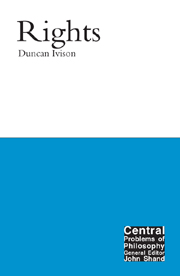8 - Human rights
Summary
Yes we agree about these rights, provided we are not asked why.
(Jacques Maritain, quoted in An-Na'im 1992: 195)Introduction
The simplest way to define human rights is to say that they are those rights that all human beings have just by virtue of being human. They are rights that individuals have, in other words, not because of any special relations with others, or through membership of a particular society, but simply by being human. But it then becomes apparent that we need to say more about exactly what those rights are, and to what and to whom the corresponding duties refer. And to do that we have to show how those rights derive from the relevant sense of our humanity. But what is the relevant sense?
Putting the question in this way can lead us to something like an argument for natural rights. Or it may lead to something like the appeal to dignity, as in Kant's moral theory. More generally, in his influential paper (Hart 1984), Hart distinguished between “general rights” and “special rights”, and many contemporary philosophers have seen this as offering a way of making sense of human rights (see the discussion in Beitz 2001; 2003). “General rights” are rights that belong to all men “capable of choice”, in the absence of any special conditions or relations that give rise to “special rights”. The one general right he identifies is the “equal right of all men to be free”, although there may well be others (ibid.).
- Type
- Chapter
- Information
- Rights , pp. 198 - 234Publisher: Acumen PublishingPrint publication year: 2007

